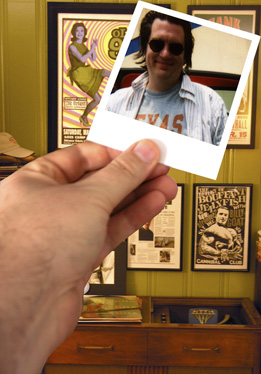 William Faulkner once wrote, “The past is never dead. It's not even past.”
William Faulkner once wrote, “The past is never dead. It's not even past.”
True dat. I can still remember sitting in bar drinking Guinness and talking with PeteG about the magnificence of Joe Strummer a year ago, or walking down the midway at the State Fair a decade ago with my year-old daughter perched on my shoulders or the smell of a spring evening on the first night I ever kissed my wife. To me, it seems like these things happened just this morning.
And sometimes our past and our present and our future can all become one, all tangled up in memory and possibility. And sometimes, as the great writer Tim O’Brien reminds us, sometimes the past can even save us.
I bought a book at Taylor’s Bookstore in Arlington, Texas in 1991. It was and is called “Write to the Point.” It’s a book about writing by my old professor from the University of Texas, Bill Stott.
Bill was one of my favorite professors at UT. I took a class from him in the spring of 1989 called the History of Photography that he taught with J.B. Colson, a professor of photography in the College of Communication.
To say that the class was a transcendent experience would be an understatement – I don’t believe you can learn about the genius of Walker Evans for the first time and not feel like the world has somehow changed. I spent that summer reading “Let Us Now Praise Famous Men” late into the night in a tiny yellow house on 30th Street, smoking Luckies and wondering if I could ever write something that great.
It wasn’t the last experience I had with Bill. I spent more than a few hours talking about Evans and James Agee and documentary expression during his office hours when I was still suffering from the delusion that I would go the grad school. My last semester in Austin, I took one last writing class from Bill and wrote some of the best stuff I ever wrote in college.
The real highlight for me was the way he would grade papers. Students would turn in their assignments in a 9x12 manila envelope with a typewritten paper and a blank audio cassette enclosed. Bill would read your paper aloud, grade it and return it to you. Sound terrifying? It was anything but. Not only do I treasure those memories, I still have the tapes.
That fall, I bought “Write to the Point,” read about five pages, then put it on a shelf.
In spite of my disregard for Bill’s book, I managed to make a career using words, first with eight years as a newspaperman at the Fort Worth Star-Telegram, then another few years working for Internet startups before spending almost seven years working as a corporate communications consultant for some of the biggest companies in Texas. Then one day in December of last year, I gave the middle finger to my boss after she said I could neither write nor edit.
As liberating as it can be to lay out a giant “fuck you” to someone who doubts your ability, I must confess that this prompted a bit of an existential crisis. I mean, could this person be right?
So I grabbed my copy of “Write to the Point” off the shelf. About half way through this magnificent book, I had an epiphany. Not only could I write, but realized that I learned to write in large part because Bill Stott showed me the way.
As I read, I dog-eared pages, underlined key passages, starred items and wrote things in the margins. Among them:
There is no “perfect way” to writing.Say what you mean as plainly as you can.Poets are the unacknowledged legislators of the world.Context matters enormously.Is it alright to end a sentence with a preposition? Yes.Try the first words that come to mind because they are the most natural.Style has no necessary relation to an author’s character.Writing a bad sentence is natural. All it takes to right a competent sentence is patience and practice.Write as you talk.To read these words were an affirmation and a motivation. Ever since, writing has seemed somehow different – easier and effortless. And most days, I feel pretty good about my writing, too. Some people are even kind enough to tell me that they enjoy my writing – including my new boss.
I’m grateful to Bill Stott for his teaching and his patience 20 years ago. And I’m grateful that he wrote a book like “Write to the Point” that was able to say the things I need to hear when I needed to hear them.
When I read the other day about
his struggle with cancer, it was like a dagger in the heart. How could something like this happen to someone who is so alive in my memory?
In part, that’s what got me off my ass to write this post.
I wrote last year after the passing of another great UT professor, Kurth Sprague, that if I have learned to write at all, then Kurth and Bill Stott and
F.J. Schaack were certainly, in part, responsible. I stand behind my previous statement.
But one last thing I underlined in Bill’s book I believe is worth mentioning:
“People think I can teach them style. What stuff it is. Have something to say and say it as plainly as you can. That is the only secret of style.”
So be it. Bill, you were there for me in 1989, and you were there for me again in 2008. You made a difference, and my life is better for having you as my teacher.
Thank you.

